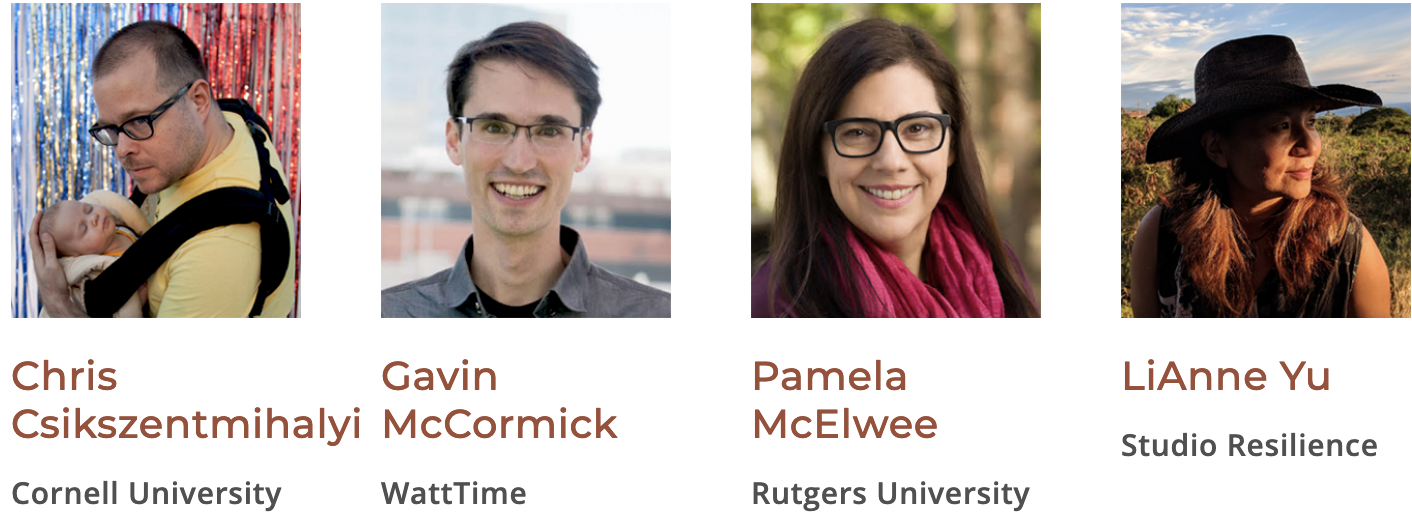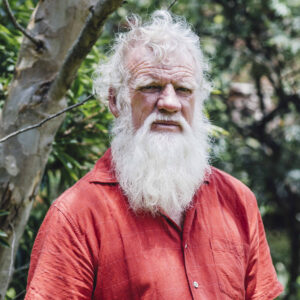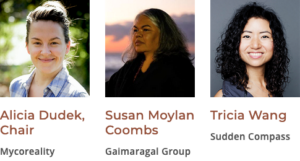Tuesday,
October 20
Meet the organizations demonstrating their commitment to ethnographic practice at EPIC2020! Network with sponsor representatives and learn about their capabilities, insights, products, and job opportunities.
Wednesday,
October 21
Meet the organizations demonstrating their commitment to ethnographic practice at EPIC2020! Network with sponsor representatives and learn about their capabilities, insights, products, and job opportunities.
Thursday,
October 22
Sponsored Panel

What does human scale mean through the lens of the environment? How does an ecological or planetary scale refract human activity? Panelists will discuss climate change from the perspectives of their worldviews and practices in ethnography, design, AI, and art. They’ll explore how we can design, provoke, educate with disparate data types and different scales.
Sponsored Panel
![]()

The Atlassian Research & Insights team commissioned a research study that involved thousands of workers across the globe to see how COVID-19 and the sudden shift to working from home has affected them. Atlassian looked inward, too, to find out how Atlassians were impacted by the sudden, lasting change to work remotely. In this panel, moderated by Head of Research & Insights, Leisa Reichelt, the people behind this work will discuss the unanticipated impacts of the pandemic that our research uncovered and how we might all respond going forward.
Sponsored Panel
![]()

The Atlassian Research & Insights team commissioned a research study that involved thousands of workers across the globe to see how COVID-19 and the sudden shift to working from home has affected them. Atlassian looked inward, too, to find out how Atlassians were impacted by the sudden, lasting change to work remotely. In this panel, moderated by Head of Research & Insights, Leisa Reichelt, the people behind this work will discuss the unanticipated impacts of the pandemic that our research uncovered and how we might all respond going forward.
Friday,
October 23
Sunday,
October 25
Following a welcome presentation by Conference Co-chairs Tania Lewis and Alexandra Zafiroglu, stay for a Chat Roulette! In pairs and small groups, we’ll use specially curated prompts to discover interesting things about each other and make meaningful connections that we’ll build on throughout the conference. This networking event brings together attendees in North & South America, East & Southeast Asia, Australia & New Zealand.
Following a welcome presentation by Conference Co-chairs Tania Lewis and Alexandra Zafiroglu, stay for a Chat Roulette! In pairs and small groups, we’ll use specially curated prompts to discover interesting things about each other and make meaningful connections that we’ll build on throughout the conference. This networking event brings together attendees in Asia, Australia & New Zealand, Africa, Europe, & Middle East.
Monday,
October 26
This session takes you inside RMIT’s Digital Ethnography Research Centre (DERC), the host of this year’s EPIC conference. DERC is known for its innovative ethnographic approaches to digital culture and society.
The session commences with DERC’s Annette Markham in dialogue with one of DERC’s founders, Larissa Hjorth. Annette and Larissa discuss their current work and how digital ethnography has evolved over time.
In the second half, five DERC researchers present their current projects in PechaKucha format:
- Blockchain Mapping and Indigenous Knowledge Systems, Megan Kelleher
- The Work of Working from Home: A COVID Ethnography, Tania Lewis, Andrew Glover & Indigo Holcombe-James
- Liminoid Media: Lasting States of In-betweenness, Rowan Wilken
- Digital Ethnographies of Digital Exclusion: Learning through Limitations, Jenny Kennedy
- Negotiating Trauma through Art and Imagining New Futures, Anna Hickey-Moody
All presenters will be available for discussion. Session Facilitator: Ellie Rennie
Mingle with Parkes
Keynote
 Genevieve Bell is Distinguished Professor, Director of the 3A Institute, and Florence Violet McKenzie Chair at the Australian National University. She is also Vice President and a Senior Fellow at Intel Corporation. Genevieve’s talk will explore how the pandemic has resulted in massive, unplanned social experiments in scale—at scale. Read more
Genevieve Bell is Distinguished Professor, Director of the 3A Institute, and Florence Violet McKenzie Chair at the Australian National University. She is also Vice President and a Senior Fellow at Intel Corporation. Genevieve’s talk will explore how the pandemic has resulted in massive, unplanned social experiments in scale—at scale. Read more
Thematic Sessions
When should systems know us as people and not as just data? Who watches the watcher when abstractions and aggregated data are used to make decisions about our lives? The flow of information and data between human and machine systems are a source of both progress and anxiety. In this session, we consider how a change in perspective (scale) leads to shifts in how data is contextualized and understood. Implications are presented on the ethnographer’s role within these systems and as the watcher of them.
How I Learned to Stop Worrying and Love Surveillance (PechaKucha)
Susan Faulkner, Intel Corporation
Scale and the Gaze of a Machine (Catalyst)
Richard Beckwith and John Sherry, Intel Corporation
Enacting change in the world is fraught with obstacles. How can individuals have a meaningful impact at a global scale? How do institutions, with their own decision-making logics and biases, impact individuals?
Scaling through Meaning to Action: What the Australian Bushfires Taught Me about Ethnography (PechaKucha)
Charlie Cochrane, Jump the Fence
Sustainability: Addressing Global Issues at a Human Scale (Catalyst)
Lee Ryan, Springboard Ideas; Louisa Wood, MostlyDandy
Thematic Sessions
When should systems know us as people and not as just data? Who watches the watcher when abstractions and aggregated data are used to make decisions about our lives? The flow of information and data between human and machine systems are a source of both progress and anxiety. In this session, we consider how a change in perspective (scale) leads to shifts in how data is contextualized and understood. Implications are presented on the ethnographer’s role within these systems and as the watcher of them.
How I Learned to Stop Worrying and Love Surveillance (PechaKucha)
Susan Faulkner, Intel Corporation
Scale and the Gaze of a Machine (Catalyst)
Richard Beckwith and John Sherry, Intel Corporation
Enacting change in the world is fraught with obstacles. How can individuals have a meaningful impact at a global scale? How do institutions, with their own decision-making logics and biases, impact individuals?
Scaling through Meaning to Action: What the Australian Bushfires Taught Me about Ethnography (PechaKucha)
Charlie Cochrane, Jump the Fence
Sustainability: Addressing Global Issues at a Human Scale (Catalyst)
Lee Ryan, Springboard Ideas; Louisa Wood, MostlyDandy
Keynote (repeated)
 Genevieve Bell is Distinguished Professor, Director of the 3A Institute, and Florence Violet McKenzie Chair at the Australian National University. She is also Vice President and a Senior Fellow at Intel Corporation. Genevieve’s talk will explore how the pandemic has resulted in massive, unplanned social experiments in scale—at scale. Read more
Genevieve Bell is Distinguished Professor, Director of the 3A Institute, and Florence Violet McKenzie Chair at the Australian National University. She is also Vice President and a Senior Fellow at Intel Corporation. Genevieve’s talk will explore how the pandemic has resulted in massive, unplanned social experiments in scale—at scale. Read more
Mingle with Wodonga
Thematic Sessions
In this session, we challenge assumptions of scale and explore what happens when we reject the notion that bigger is better and instead redefine scale to serve human values rather than corporate demands. How can scale be reconceptualized to address and meet community and human needs, first and foremost? We explore not only what scale is, but what should be scaled.
Scaling Dignity (PechaKucha)
Lorenn Ruster, 3A Institute
Growing Communities: How Social Platforms Can Help Community Groups Achieve the Right Scale at the Right Time (Case Study)
Calen Cole, Stripe Partners; Carolyn Wei, Facebook
Where Can We Find an Ethics for Scale?: How to Define an Ethical Infrastructure for the Development of Future Technologies at Global Scale (Catalyst)
Thomas Hughes, Ian Dull & Fani Ntavelou-Baum, ReD Associates
Researching the Researcher: How I Used Data Analysis to Understand My Reading Habits (PechaKucha)
Stephen Ó Mathúna, Workday
Beyond User Needs: A Meaning-Oriented Approach to Recommender Systems (Case Study)
Iveta Hajdakova, Stripe Partners; Sohit Karol and Debra McDonald, Spotify
Leveling Up Your Research and Operations: Strategies for Scale (Catalyst)
Brigette Metzler, Services Australia
Panel
This session will explore the specific reasons organizations generate ideas about the future, the methods they choose, how they act on foresight, and consequences for both business and society. We will address the theme of scale in various dimensions, such as how to appropriately scale our imaginings, scaling to multiple time horizons, scaling breadth vs. depth of focus, and thinking of scale in terms of organizational value creation.
Tuesday,
October 27
Thematic Session
Scaling is Like Making Sourdough (PechaKucha)
Karyn Georgilis, Continuum Innovation
DIYing along with DIYers: Juggling with Scales During Home-Improvement Research (Case Study)
Guillaume Montagu, unknowns consultancy
There’s No Playbook for Praxis: Translating Scholarship into Action to Build a More Ethical Bank (Catalyst)
Jeffrey Greger, Varo
Thematic Sessions
The City as Organization: Ethnography for Alternative Futures (Case Study)
Hal Wuertz & Jordan Shade, IBM
Scaling Out (not only Up): Distributed Models of Collaboration to Get Work Done (Catalyst)
Alicia Dornadic, Nikki Lavoie, Elvin Tuygan & Sheila Suarez de Flores, MindSpark Research International
I’m not Scaling, the World Is Really Scaling against Me (PechaKucha)
Smriti Kaul, Convo Research and Strategy
Fighting Conspiracy Theories Online at Scale (Case Study)
Rebekah Park and David Hollander Zax, ReD Associates; Beth Goldberg Jigsaw, Jigsaw/Google
Toxicity v. toxicity: How Ethnography Can Inform Scalable Technical Solutions (Catalyst)
Jamie Sherman, Intel Corporation; Anne Page McClard
Mingle with Parkes
Keynote
 A celebrated writer and thinker, Bruce Pascoe is the author of many internationally acclaimed books and short story collections. A Board member of First Languages Australia and Past Secretary of Bidwell-Maap Aboriginal Nation, Bruce received the Australia Council’s lifetime Achievement Award for Literature in 2018. Read more
A celebrated writer and thinker, Bruce Pascoe is the author of many internationally acclaimed books and short story collections. A Board member of First Languages Australia and Past Secretary of Bidwell-Maap Aboriginal Nation, Bruce received the Australia Council’s lifetime Achievement Award for Literature in 2018. Read more
Thematic Sessions
How Tragic Flaws Resonate at Scale—Just Ask Shakespeare (PechaKucha)
Megan Davis, Spendlove and Lamb
Harnessing “Mass Empathy” to Scale a Healthtech Start-Up during the COVID-19 Pandemic: A Communication Tool for Critical Care Contexts (Case Study)
Nadya Pohran, University of Cambridge; Simon Pulman-Jones, Emergence Now; Amy Weatherup, AJM Enterprises; Tim Baker, Symptech Ltd
Empathy, More or Less: Scaling Intermediary Experiences of Emotion and Affect in Entrepreneurship and Innovation (Catalyst)
Lora Koycheva, Technical University of Munich
Architecture isn’t just art; it physically shapes the ways in which we live and work. This session explores the intersections of vision and concrete building materials, thinking through the ways in which people and populations are affected by the built environment. In these ways, spaces are different from places. These works address the importance/centrality of different types of buildings (edifices) and the practices that they make possible.
Ten People Thick: Change by Design (PechaKucha)
Sue Wittenoom, The Soft Build
How to Go from Global to Local and Back Again: The Case of a Walking Drive Model in France (Case Study)
Marc Antoine Morier, unknowns consultancy
Who Cares Where? Ethnographic Research for Medical-Device Design for Hospital-Home Care in an Italian Hospital (Case Study)
Isabel Farina, Michele Visciola, Elena Guidorzi, Elena Messina & Chiara Agamennone, Experientia
Keynote (repeated)
 A celebrated writer and thinker, Bruce Pascoe is the author of many internationally acclaimed books and short story collections. A Board member of First Languages Australia and Past Secretary of Bidwell-Maap Aboriginal Nation, Bruce received the Australia Council’s lifetime Achievement Award for Literature in 2018. Read more
A celebrated writer and thinker, Bruce Pascoe is the author of many internationally acclaimed books and short story collections. A Board member of First Languages Australia and Past Secretary of Bidwell-Maap Aboriginal Nation, Bruce received the Australia Council’s lifetime Achievement Award for Literature in 2018. Read more
Mingle with Wodonga
Wednesday,
October 28
Thematic Sessions
Software Quality and Its Entanglements in Practice (Case Study)
Julia Prior & John Leaney, University of Technology Sydney
Ghost in the Machine: How Taxonomic Metadata Allows for Scaling Ethnographic Insights into Search Algorithms (Case Study)
Amanda Krauss, Duo Security; Alexandra Teodorescu & Leora Yardenay, Indeed
This session draws on experiences ranging from early ethnographic accounts of life on islands, COVID-19 hospital wards, and the International Space Station to explore how we work and live in a period of enforced distancing and isolation.
Postcards from Isolation: Digital Artefacts from the Lockdown Time (PechaKucha)
Anna Aurelia Wojnarowska, Google
Architecture Can Heal: Spatial Literacy to Protect COVID-19 Healthcare Workers (Case Study)
Ashley Marsh, Mass Design Group; Michael Dolinger, Mount Sinai Kravis Children’s Hospital
From the Space Station to the Sofa: Scales of Isolation at Work (Catalyst)
Jo Aiken, University College London; Angela Ramer, HKS
Panel

We invented our world at human height, with us in the middle. Much of our work is designed even more narrowly, with a particular kind of human at the middle. What happens when we go beyond the limited “user-centric” or “human-centric” scales? What does it look like, feel like, move like when humans are not in the middle of the system?
Mingle with Parkes
Thematic Sessions
Enacting Scales: Reflections from an Anthropologist Working in Asia’s Ad World (PechaKucha)
Tiffany Tivasuradej, Ogilvy
Scaling Experience Measurement: Capturing and Quantifying User Experiences across the Real Estate Journey (Case Study)
Rebecca Hazen, Genny Mangum & Tom Souhlas, Zillow Group
One Small Step for Ethnography, One Giant Leap for Banking and Insurance (PechaKucha)
Sara Kluckhohn & Jennifer Roth, USAA
In this session, we consider how ethnographic perspectives illuminate the importance of goals beside or alongside ‘bigger, faster, easier, broader’ and how we re-orient stakeholders to new goals while still creating business value. We’ll discuss shared challenges and strategies for building corporate models of scale that can speak to and learn from alternative goals and metrics. Presentations:
The Repurposing of Risograph Machines (PechaKucha)
Joyce Lee, Atlassian
Who Gets to Define Success? Listening to Stories of User Value to Redefine Metrics and Revive a Decommissioned Product (Case Study)
Gemma Petrie & Jennifer Davidson, Mozilla
Everybody’s a Winner: A Study on How Scaling up as an Entrepreneurial Rite of Passage Is Beginning to Be Resisted in India’s Startup Capital (Catalyst)
Gitika Saksena & Abhishek Mohanty, LagomWorks Consulting
Thematic Sessions
Software Quality and Its Entanglements in Practice (Case Study)
Julia Prior & John Leaney, University of Technology Sydney
Ghost in the Machine: How Taxonomic Metadata Allows for Scaling Ethnographic Insights into Search Algorithms (Case Study)
Amanda Krauss, Duo Security; Alexandra Teodorescu & Leora Yardenay, Indeed
In this session, we consider how ethnography takes root and grows in organizations. We’ll investigate the many models, meanings, and uses of ethnography developed and deployed, addressing their successes, failures, and ethical implications. This session focuses on the struggles we experience as we attempt to scale our practice in our organizations and industries.
Enacting Scales: Reflections from an Anthropologist Working in Asia’s Ad World (PechaKucha)
Tiffany Tivasuradej, Ogilvy
Scaling Experience Measurement: Capturing and Quantifying User Experiences across the Real Estate Journey (Case Study)
Rebecca Hazen, Genny Mangum & Tom Souhlas, Zillow Group
One Small Step for Ethnography, One Giant Leap for Banking and Insurance (PechaKucha)
Sara Kluckhohn & Jennifer Roth, USAA

 Ashwini Asokan is the CEO & Co-Founder of Mad Street Den, a computer vision and artificial intelligence company. Working across US, India, LatAm, Europe, UAE, and Japan, her team is driving change in how companies think about the future with AI.
Ashwini Asokan is the CEO & Co-Founder of Mad Street Den, a computer vision and artificial intelligence company. Working across US, India, LatAm, Europe, UAE, and Japan, her team is driving change in how companies think about the future with AI.